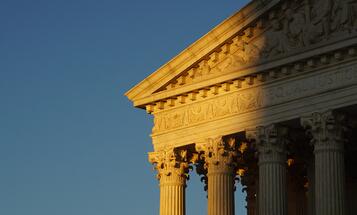
Momentum Builds for A Constitutional Amendment to Fight Big Money
The Roberts Court's campaign finance jurisprudence has one over-arching theme: morphing the First Amendment into a tool for powerful interests and wealthy individuals to use to dominate the political process. This has tied the hands of advocates and policymakers working to curb the influence of big money.
There are still plenty of reforms worth pursuing that the Court hasn't put on its verboten list--like small donor matching in New York State and the Grassroots Democracy Act at the federal level.
But, advocates and organizers are focused on recapturing the Constitution for the people by enacting a constitutional amendment to overturn troubling precedents such as Buckley v. Valeo (money is speech, leveling the playing field and spending limits are forbidden) and Citizens United v. FEC (corporations have free speech rights, "independent expenditures" can't corrupt as a matter of law).
This won't be easy, but it's a worthwhile project. And, this has been a good week for amendment advocates.
On Thursday, New Jersey became the ninth state to pass a resolution calling for an amendment. This comes on the heels of hundreds of communities also calling for a constitutional fix to our money-in-politics problems.
On Friday, Avaaz's Elections Not Auctions project released a new poll showing two-thirds (and bipartisan) support for an amendment in Connecticut, Montana, and Wisconsin. The poll is in line with previous research showing broad support across party and ideology for tackling the outsized role of a narrow slice of special interests and wealthy donors.
With Super PACs and "dark money" groups drowning out the voices of average citizens in a sea of (often secret) cash, now is the time to push our elected leaders to step up to build a democracy in which the strength of a citizen's voice doesn't depend upon the size of her wallet.



